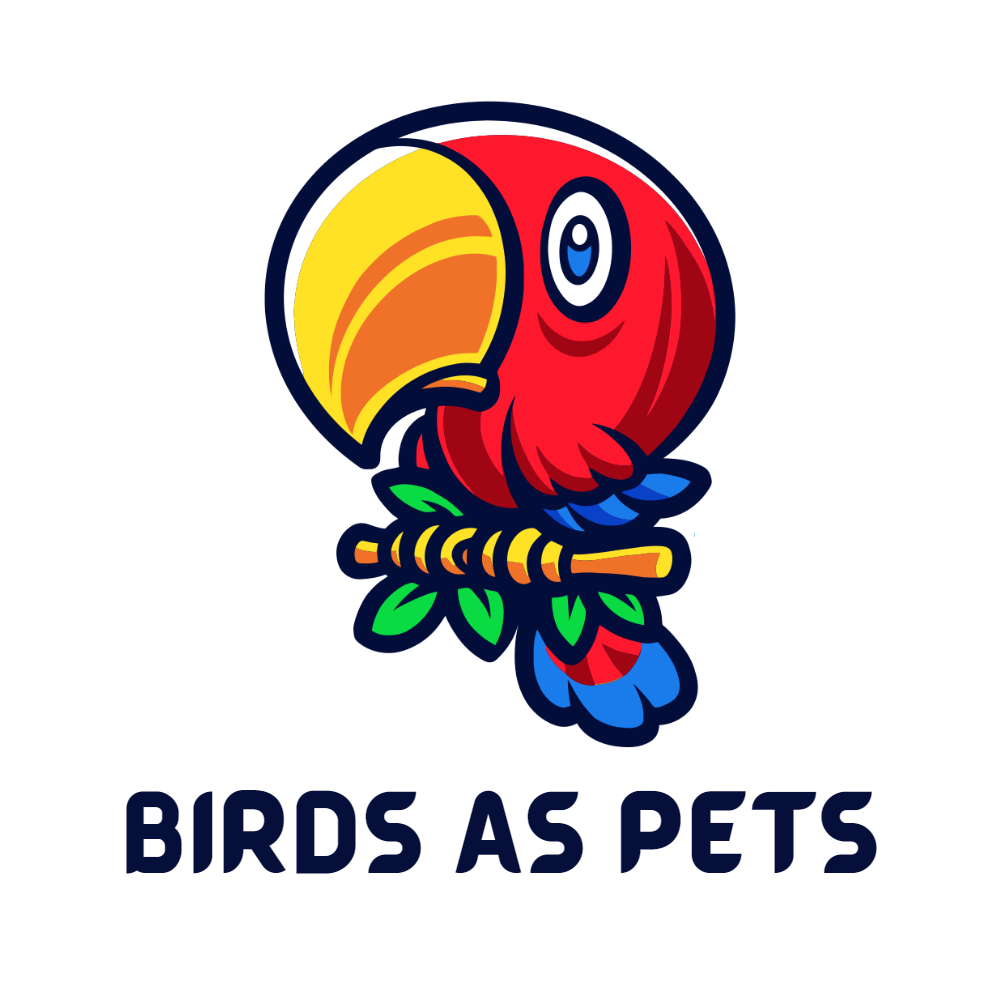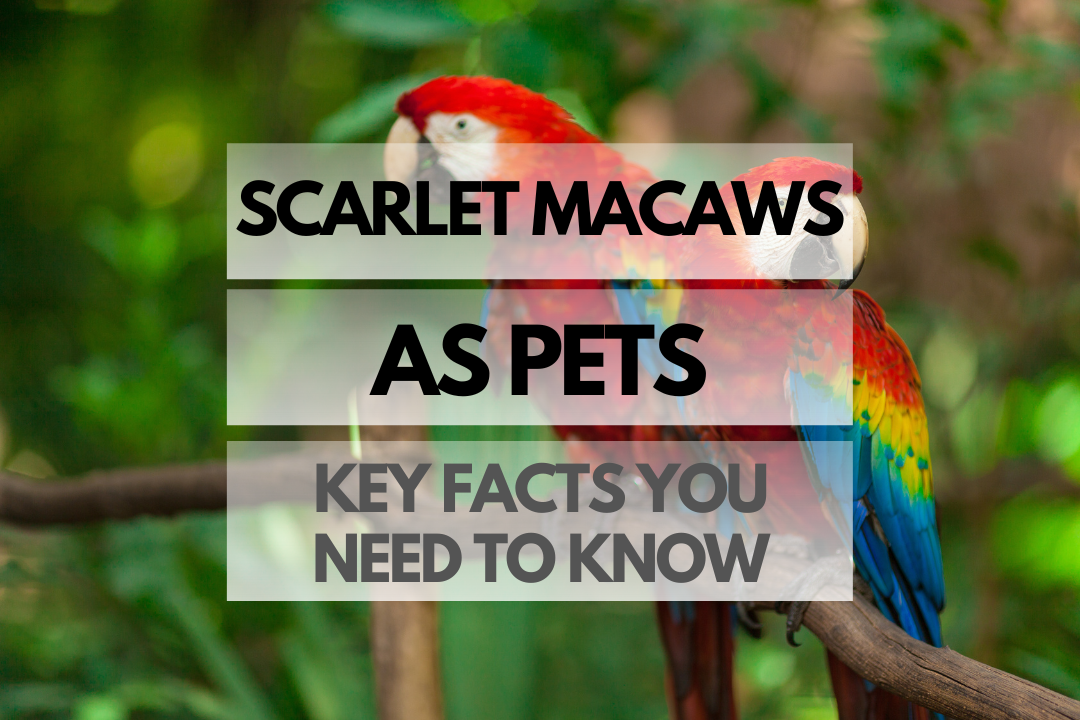Scarlet Macaws are vibrant, beautiful, and intelligent birds that can make a unique addition to the right household. However, these wonderful creatures come with a fair share of responsibilities and considerations. In this article, we’ll explore everything you need to know about Scarlet Macaws as pets, from their natural habitat to their lifespan, care, and more.
Quick Reference Table: Scarlet Macaw Facts
| Fact | Details |
|---|---|
| Size | 32-36 inches (81-91 cm) in length |
| Weight | 2-2.5 lbs (900-1150 grams) |
| Lifespan | 40-60 years in captivity |
| Natural Habitat | Rainforests of Central and South America |
| Cage Size | Minimum 5 ft x 3 ft x 4 ft (1.5m x 0.9m x 1.2m) |
| Clutch Size | 2-4 eggs |
Where Do Wild Scarlet Macaws Live?
Scarlet Macaws are native to the rainforests of Central and South America, spanning from Mexico to Brazil. They inhabit humid, lowland forests and prefer areas near rivers and swamps. In their natural habitat, Scarlet Macaws are social birds that live in pairs, family groups, or flocks, often flying and foraging together during the day.
Scarlet Macaw Lifespan: How Long Do They Live as Pets?
Scarlet Macaws are known for their impressive longevity, with a life expectancy of 40-60 years in captivity. This long lifespan means that owning a Scarlet Macaw is a significant, long-term commitment. Prospective owners should be prepared to dedicate time, resources, and attention to their care for many years to come.
Are Scarlet Macaws Good Pets?
Scarlet Macaws can make wonderful pets for experienced bird owners who are prepared to meet their unique needs. They are intelligent, inquisitive, and affectionate birds, often forming strong bonds with their human companions. However, they require a significant amount of time, attention, and mental stimulation to thrive, making them a challenging choice for first-time bird owners or those with limited time and resources.
Are Scarlet Macaws as Pets Good for Beginners?
Due to their size, intelligence, and demanding care requirements, Scarlet Macaws are not recommended for first-time bird owners. Inexperienced owners may find it challenging to provide the necessary level of care, and the birds themselves may suffer as a result. It’s essential to gain experience with smaller, less demanding parrot species before considering a Scarlet Macaw as a pet.
Are Scarlet Macaws Easy to Care For?
Scarlet Macaws require a significant amount of care, including a spacious cage, a varied diet, and plenty of social interaction and mental stimulation. Although they can be quite hardy when properly cared for, they are prone to behavioral and health issues if their needs are not met. Owners must be prepared to invest time and effort into meeting these requirements for a happy, healthy bird.
Scarlet Macaw Pros and Cons
| Pros | Cons |
|---|---|
| Intelligent and trainable | Require a significant time commitment |
| Affectionate and bond with owners | Can be loud and noisy |
| Long lifespan | Expensive to purchase and maintain |
| Vibrant, unique appearance | Not suitable for first-time bird owners |
Scarlet Macaw Price and Costs
The price of a Scarlet Macaw can range from $1,500 to $4,000, depending on factors such as age, breeder reputation, and location. In addition to the initial purchase price, owners should be prepared for costs associated with a large cage, toys, perches, and a varied diet. Ongoing expenses include food, veterinary care, and other supplies, which can add up over the bird’s long lifespan.
Where to Buy Scarlet Macaws
When looking to purchase a Scarlet Macaw, it’s important to find a reputable breeder or rescue organization. This ensures that the birds have been raised in a healthy, ethical environment and are well-socialized. Always insist on visiting the breeder or rescue in person to observe the living conditions and interact with the birds before making a decision.
Caring for Scarlet Macaws
Scarlet Macaws require specific care to ensure their wellbeing. This includes providing a spacious living environment, a balanced diet, and consistent social interaction and mental stimulation. Owners must be prepared to invest time and effort into meeting these needs.
Scarlet Macaw Food
A balanced diet is essential for a healthy Scarlet Macaw. This should include a high-quality pellet mix, fresh fruits and vegetables, nuts, and seeds. It’s important to vary the types of fruits and vegetables offered to ensure they receive a range of nutrients. Additionally, it’s crucial to avoid feeding them toxic or unhealthy foods, such as avocado, chocolate, or high-fat, salted snacks.
Health and Common Issues
Scarlet Macaws are prone to several health issues, including feather plucking, self-mutilation, and respiratory infections. Many of these problems can be prevented or minimized through proper care, including a balanced diet, clean living conditions, and regular veterinary check-ups. Owners should familiarize themselves with the signs of illness in their birds and seek veterinary attention promptly if concerns arise.
Signs of Healthy Scarlet Macaws vs. Sick Ones
| Healthy Scarlet Macaw | Sick Scarlet Macaw |
|---|---|
| Bright, clear eyes | Discharge or cloudiness in eyes |
| Smooth, vibrant feathers | Feather plucking or dull, ragged feathers |
| Active and alert behavior | Lethargy or depression |
| Strong, consistent appetite | Loss of appetite or weight loss |
| Normal droppings | Diarrhea, discolored, or abnormal droppings |
Scarlet Macaws Pet Insurance
Just like any other pet, Scarlet Macaws can benefit from pet insurance. It’s essential to find an insurance policy that specifically covers exotic birds, as these policies will cater to their unique health needs. Pet insurance can help cover the cost of veterinary care, including wellness check-ups, treatments, surgical procedures, and more. Investing in pet insurance for your Scarlet Macaw can provide peace of mind and ensure they receive the best possible care throughout their life.
Personality and Behavior
Scarlet Macaws are known for their vibrant colors and charismatic personalities. They’re intelligent, affectionate, and playful, making them a popular choice among bird enthusiasts. These birds are highly active and love to explore their surroundings, climb, and play with toys. They also enjoy spending time with their human companions and can form strong bonds with their owners. However, they can also be quite loud and demanding, so it’s essential to be prepared for the responsibility that comes with owning a Scarlet Macaw.
Are Scarlet Macaws Social?
Yes, Scarlet Macaws are very social creatures. In the wild, they live in large flocks, so they naturally thrive in social environments. As pets, they enjoy interacting with their human family members and even other pets. However, they require a lot of attention and mental stimulation, so it’s essential to spend quality time with them and provide them with plenty of toys and activities to keep them entertained.
Speech and Noise of Scarlet Macaws
Scarlet Macaws are known for their impressive vocal abilities. They can mimic human speech and various sounds, making them one of the most talkative parrot species. However, they’re also quite loud and can produce ear-piercing screams when they’re excited, stressed, or seeking attention. It’s essential to provide them with a stimulating environment and consistent training to minimize excessive noise levels.
Similar Species to Scarlet Macaws
There are several species of macaws that share similarities with the Scarlet Macaw. Some of these include:
- Blue-and-Gold Macaw
- Green-winged Macaw
- Hyacinth Macaw
- Military Macaw
- Red-fronted Macaw
While each of these species has its unique characteristics, they all share traits such as intelligence, sociability, and beautiful plumage.
Can Scarlet Macaws Live With Other Pets and Birds?
Scarlet Macaws can coexist with other pets, including other birds, as long as they are properly introduced and supervised. However, it’s essential to consider the temperament and size of both the Scarlet Macaw and the other pets, as larger birds can sometimes be aggressive towards smaller animals. To ensure harmony in your household, provide ample space for each pet and monitor their interactions closely, especially during the initial introduction phase.
Are Scarlet Macaws Legal to Have as Pets?
In most countries, it is legal to own a Scarlet Macaw as a pet. However, there may be specific regulations and permits required for owning exotic birds, depending on your location. It’s essential to research local laws and consult with your local wildlife or animal control agency before acquiring a Scarlet Macaw.
Additional Resources
- World Parrot Trust
- Parrots subreddit
- Parrot Lovers Unite – Facebook Group
- Avian and Exotic Animal Care
FAQ for Scarlet Macaws as Pets
Do Scarlet Macaws talk?
Yes, Scarlet Macaws can talk and are known for their impressive ability to mimic human speech and various sounds.
Are Scarlet Macaws suitable for families with young kids?
Scarlet Macaws can be a good fit for families with older children who understand how to interact with them safely and respectfully. However, they may not be the best choice for families with very young kids, as their size, strength, and noise levels can be overwhelming for small children.
Can Scarlet Macaws be trained?
Yes, Scarlet Macaws are intelligent birds and can be trained to perform various tricks, talk,and understand commands. Consistent, positive reinforcement training is key to successfully teaching them new skills.
How do I know what gender Scarlet Macaws are?
Determining the gender of a Scarlet Macaw can be challenging, as they do not exhibit noticeable sexual dimorphism. The most accurate way to determine their gender is through DNA testing or endoscopic examination by an avian veterinarian.
How long do Scarlet Macaws live?
With proper care, Scarlet Macaws can live for up to 50 years or more. Providing a healthy diet, regular veterinary care, and a stimulating environment are crucial factors in ensuring a long, happy life for your macaw.
How big of a cage do Scarlet Macaws need?
Scarlet Macaws require a large, spacious cage to accommodate their size and activity level. A minimum cage size of 36 inches wide, 48 inches tall, and 48 inches deep is recommended. Additionally, the cage should have strong bars to prevent your macaw from bending or breaking them.

